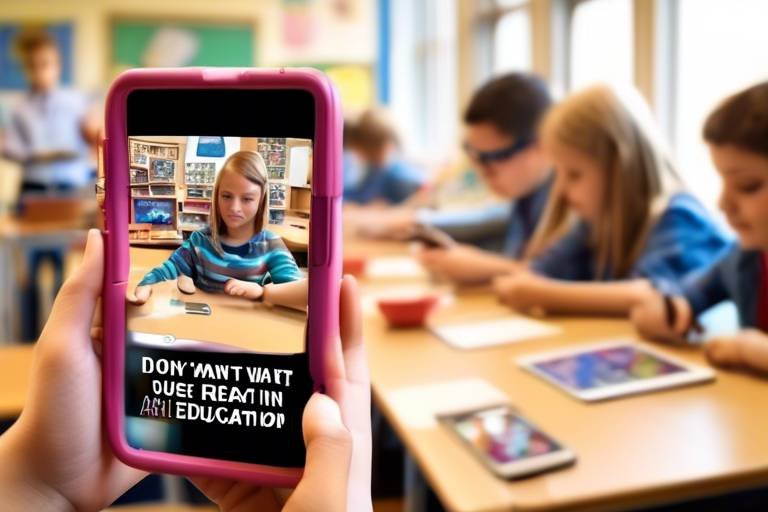How Technology is Influencing Modern Parenting
In today's fast-paced world, technology is not just a tool; it’s a game changer, especially when it comes to parenting. Gone are the days when parents relied solely on traditional methods to raise their children. Now, with a simple swipe or click, parents have access to a plethora of resources that can enhance their parenting experience. But how exactly is technology reshaping the way we nurture and guide our little ones? Let’s dive into the fascinating ways technology is influencing modern parenting.
Communication apps have revolutionized the way parents interact with their children. Remember the days when you had to wait for a phone call or send a letter to stay in touch? Now, with instant messaging and video calls, parents can connect with their kids in real-time, no matter where they are. Imagine being at work and being able to see your child's face during a quick video chat. It’s like having a virtual hug! This immediacy not only strengthens family bonds but also ensures that parents can be present in their children's lives, even from afar.
With the rise of educational technology, parents now have innovative tools at their fingertips to enhance their children's learning experiences. Interactive apps and online resources make learning fun and engaging, transforming mundane subjects into exciting adventures. For instance, apps that turn math problems into games can spark a child's interest in numbers. However, with great power comes great responsibility. Parents must navigate the vast world of educational tools to find what truly benefits their children.
As technology becomes more integrated into daily life, managing screen time has become crucial for parents. Balancing the educational benefits of technology with potential distractions and health concerns is no small feat. It's like walking a tightrope! Parents need to establish a healthy relationship between their children and screens, ensuring that technology serves as a tool for learning rather than a source of conflict.
Establishing clear boundaries around screen time is essential. Parents can create a family media plan that outlines when and how technology can be used. This approach helps children understand that while technology is a valuable resource, it also has its limits. For example, setting specific times for homework, play, and family activities can foster a balanced lifestyle.
Utilizing parental control features is another effective way to promote a safer online environment. These tools allow parents to monitor and limit their children's access to inappropriate content. By setting up filters and restrictions, parents can ensure that their kids are exploring the internet safely, much like a lifeguard watching over children at a pool. It’s about providing freedom while ensuring safety.
Social media has dramatically changed the landscape of parenting. Parents now share experiences, seek advice, and connect with others through various platforms. While this connectivity can be a blessing, it also comes with challenges. The curated lives we see on social media can lead to unrealistic expectations and comparisons. How do we navigate this double-edged sword? It’s essential for parents to remember that behind every perfect post, there’s a real-life story filled with ups and downs.
The internet has birthed online communities where parents can exchange tips, share experiences, and find support. These platforms can be invaluable for parents looking to navigate the complexities of raising children today. Whether it’s a Facebook group or a dedicated parenting forum, these communities provide a sense of belonging and understanding. It’s like having a village at your fingertips!
Online forums and social media groups are treasure troves of resources and emotional support for parents. They allow individuals to connect with others facing similar challenges, from sleepless nights to toddler tantrums. This sharing of experiences can be incredibly comforting, reminding parents that they are not alone in their struggles.
However, while online communities offer support, they also present risks. Misinformation can spread like wildfire, and negative comparisons can lead to feelings of inadequacy. Parents must navigate these waters carefully, ensuring that the information they consume is credible and beneficial. It’s crucial to maintain a healthy perspective and remember that every family is unique.
As technology continues to evolve, so too will its influence on parenting. New tools and resources will emerge, presenting both challenges and opportunities for future generations. It’s an exciting time to be a parent, but it also requires adaptability and a willingness to learn. The key is to embrace technology as a partner in parenting, using it to enhance the parent-child relationship while being mindful of its potential pitfalls.
- How can I ensure my child uses technology safely? Establish clear rules and utilize parental controls to monitor usage.
- What are some good educational apps for kids? Look for apps that promote interactive learning and align with your child's interests.
- How do I manage my child's screen time effectively? Create a balanced schedule that includes time for homework, play, and family interaction.
- Are online parenting communities beneficial? Yes, they provide support and shared experiences, but be cautious of misinformation.

The Role of Communication Apps
In today's fast-paced world, communication apps have revolutionized the way parents interact with their children. Gone are the days when a simple phone call or handwritten letter sufficed. Now, with just a few taps on a screen, parents can send a quick message, share a photo, or even have a video call that feels almost as intimate as being in the same room. This immediacy strengthens family bonds, especially for those who may be physically separated due to work or other commitments.
Imagine a scenario where a parent is traveling for work. Instead of feeling disconnected, they can use apps like WhatsApp, FaceTime, or Zoom to check in with their kids in real time. This not only reassures the children but also allows parents to be part of their daily lives, sharing moments like homework help or bedtime stories, even from afar. The ability to communicate instantly means that parents can offer support and guidance whenever it’s needed, making them feel more involved in their children's lives.
Moreover, these apps come with features that enhance interaction. For instance, many communication platforms allow for group chats, enabling parents to connect not just with their children but also with other family members or friends. This can be particularly beneficial for organizing family activities or simply sharing updates about each other's lives. Additionally, the multimedia capabilities of these apps mean that parents can send voice notes, videos, or photos, making communication more dynamic and engaging.
However, while these tools offer incredible benefits, they also require a degree of responsibility. It's essential for parents to set guidelines on how and when these apps are used. For instance, during family meals or quality time, it might be wise to limit the use of devices to foster deeper connections. Striking a balance between technology use and personal interaction is crucial. After all, while technology can enhance communication, it should never replace face-to-face interactions.
In conclusion, communication apps have become an integral part of modern parenting, providing a platform for connection that transcends distance. By embracing these tools while also setting appropriate boundaries, parents can nurture their relationships with their children in ways that were previously unimaginable. As we move forward, it's clear that technology will continue to play a significant role in shaping the dynamics of family communication.

Educational Technology for Kids
In today's fast-paced world, educational technology has emerged as a game changer for kids and parents alike. It’s like having a treasure chest filled with interactive tools and resources right at your fingertips! Imagine your child diving into a world of learning where education meets entertainment. With the rise of tablets, smartphones, and computers, children are no longer confined to the traditional classroom setting. Instead, they can explore educational apps, online courses, and interactive games that make learning feel like an adventure.
These technological innovations are not just about making learning fun; they also offer a variety of benefits that can significantly enhance your child's educational journey. For instance, platforms like Khan Academy and ABCmouse provide personalized learning experiences tailored to your child’s unique needs. This means that whether your little one is a budding mathematician or a future artist, there’s something out there that can help them thrive. The flexibility of online learning allows kids to learn at their own pace, which can be incredibly empowering.
Moreover, educational technology fosters engagement in ways that traditional methods simply can’t. When kids are using interactive apps, they are not just passively receiving information; they are actively involved in the learning process. For example, platforms that incorporate gamification—like Prodigy Math—turn math problems into exciting quests. This element of play can motivate children to tackle subjects they might otherwise shy away from, making learning feel less like a chore and more like a challenge.
However, as with any tool, it’s essential to approach educational technology with a balanced mindset. While there are countless benefits, parents should also be aware of the potential distractions that come with screen time. Managing screen time effectively is crucial to ensure that technology serves as an ally in your child's education rather than a hindrance. Finding the right balance can be similar to walking a tightrope; it requires careful consideration and a bit of practice.
To help parents navigate this landscape, here are a few tips on integrating educational technology into your child’s routine:
- Choose Quality Content: Look for apps and programs that are not only entertaining but also educational.
- Set Time Limits: Establish clear guidelines on how much screen time is appropriate for educational purposes.
- Encourage Interaction: Engage with your child during their learning sessions. Discuss what they learned and ask questions to spark further interest.
In conclusion, the rise of educational technology for kids is a double-edged sword. It offers incredible opportunities for learning and engagement, but it also requires parents to be vigilant and proactive in managing their children's use of technology. By embracing these tools while setting appropriate boundaries, parents can help their children unlock their full potential in a world that is increasingly driven by technology.

Screen Time Management
Managing screen time has become one of the most pressing challenges for modern parents. With the proliferation of devices and digital content, it can sometimes feel like a full-time job just to keep track of how much time our kids are spending in front of screens. But why is screen time management so crucial? Well, just like a balanced diet, our children need a healthy mix of activities to thrive. Too much screen time can lead to a host of issues, from decreased physical activity to sleep disturbances and even behavioral problems.
One of the first steps in effective screen time management is understanding the difference between educational and entertainment screen time. While educational content can enhance learning and cognitive development, excessive entertainment use can lead to distractions and dependency. This is where parents need to step in and take control. Setting clear guidelines around screen time can help children develop a healthy relationship with technology. For instance, you might designate specific times for educational apps and limit entertainment to weekends. This way, you can ensure that technology serves as a beneficial tool rather than a source of conflict.
To help visualize the balance, consider this simple screen time guideline table:
| Age Group | Recommended Daily Screen Time | Type of Screen Time |
|---|---|---|
| 0-2 years | No screen time | Video chatting with family |
| 2-5 years | 1 hour | High-quality educational content |
| 6-18 years | 1-2 hours | Educational and recreational content |
Another critical aspect of screen time management is setting boundaries. This involves not only limiting the amount of time spent on devices but also deciding when and where screens can be used. For example, you might want to implement a rule that screens are not allowed during family meals or before bedtime. This not only encourages family bonding but also promotes better sleep hygiene. After all, who hasn’t heard about the negative effects of blue light on sleep patterns? It’s like trying to fall asleep in a brightly lit room!
Furthermore, parental control tools can be a game-changer in this digital age. Many devices come equipped with built-in parental controls that allow you to monitor your child’s screen time and restrict access to inappropriate content. This gives parents peace of mind and helps ensure that technology is being used safely and responsibly. But remember, these controls should not replace open conversations with your children about their online activities. Engaging them in discussions about what they are watching or playing can foster a sense of responsibility and encourage them to make better choices.
In conclusion, managing screen time effectively is not just about restricting access; it’s about creating a balanced approach that incorporates educational value while minimizing potential risks. By setting clear boundaries, utilizing parental controls, and engaging in meaningful conversations with your children, you can help them navigate the digital landscape safely and responsibly.
- What is the recommended screen time for children? The American Academy of Pediatrics recommends no screen time for children under 2, and for those aged 2 to 5, no more than one hour of high-quality programming each day.
- How can I set boundaries around screen time? Establish specific times for screen use, designate screen-free zones, and encourage other activities like reading, sports, or family time.
- Are parental controls effective? Yes, parental controls can help monitor and limit access to inappropriate content, but they should complement open discussions about technology use.

Setting Boundaries
In today's tech-savvy world, setting boundaries around screen time can feel like a Herculean task for many parents. With the endless array of devices and apps vying for a child's attention, it's crucial to establish a framework that helps kids understand the importance of moderation. Think of it like teaching a child to ride a bike: you wouldn't just let them zoom off without any guidance, right? Boundaries provide that necessary guidance, ensuring that technology becomes a tool for learning rather than a source of conflict.
One effective approach is to create a family tech agreement. This document outlines the rules and expectations regarding technology use in your household. It can include specifics like:
- Daily screen time limits
- Designated tech-free zones (like the dining room)
- Guidelines for the types of content that are appropriate
By involving your children in the creation of this agreement, you help them feel a sense of ownership and responsibility. It's not just about you imposing rules; it's about fostering a collaborative environment where everyone understands the 'why' behind the boundaries.
Moreover, consistency is key. Just like a lighthouse guiding ships safely to shore, consistent rules can help children navigate their tech usage. If parents waver on the boundaries, it sends mixed signals. For instance, if one day a child is allowed to play games for three hours, but the next day it’s suddenly cut to one hour without a clear explanation, it can lead to frustration and rebellion. Instead, ensure that everyone in the household is on the same page, reinforcing the boundaries together.
Lastly, remember to lead by example. Children are like sponges, soaking up the behaviors they observe. If they see you glued to your phone during family time, they might not understand why they can’t do the same. Show them the importance of being present and engaged in the moment. By setting these boundaries, you’re not only helping your children develop a healthy relationship with technology but also nurturing their ability to focus, engage, and connect with the world around them.

Parental Controls
In today's digital age, have become an essential tool for safeguarding children as they navigate the vast online world. These controls empower parents to create a safer environment by allowing them to monitor and restrict their children's access to various online content. Imagine being a digital gatekeeper, ensuring that your kids can explore the internet while staying protected from harmful or inappropriate material. Isn't that a comforting thought?
With a plethora of options available, parents can choose from built-in features on devices, third-party applications, and even network-level controls. Each of these solutions offers unique functionalities to help you manage your child's screen time and online interactions. For instance, many smartphones and tablets come equipped with settings that allow you to:
- Limit app usage
- Block specific websites
- Set time restrictions on device usage
By utilizing these features, you can tailor your child's online experience to align with your family's values and expectations. It's like customizing a playlist; you decide what songs are included and which ones are skipped!
Furthermore, parental control software often includes monitoring capabilities that alert you to suspicious activities, such as inappropriate search queries or contact with unknown individuals. This proactive approach can be invaluable in identifying potential risks before they escalate. However, it’s important to strike a balance. While these tools are incredibly helpful, they should complement open dialogues about internet safety rather than replace them. Think of it as the foundation of a house; you need both strong walls (controls) and a solid roof (communication) to create a safe space.
As technology continues to evolve, so too will the tools available for parental controls. Keeping abreast of these advancements can empower you to make informed decisions about your child’s digital experiences. Remember, the goal is not to eliminate technology from their lives but to guide them in using it responsibly. After all, we want our children to be equipped to navigate the digital landscape confidently.
In conclusion, parental controls are not just about restriction; they are about enhancing your child's online experience while ensuring their safety. By utilizing these tools effectively, you can foster a healthy relationship between your children and technology, allowing them to explore, learn, and grow in a secure environment.
- What are parental controls? Parental controls are features that allow parents to monitor and manage their children's online activities, ensuring a safer digital experience.
- How can I set up parental controls on my child's device? Most devices have built-in parental control settings. You can also download third-party apps designed for this purpose.
- Are parental controls foolproof? While they are a valuable tool, parental controls should be used in conjunction with open communication about online safety.
- What should I do if my child bypasses parental controls? Engage in a conversation about the importance of internet safety and consider adjusting the controls to better suit their needs.

Social Media Impact on Parenting
This article explores the various ways technology impacts parenting today, from communication tools to educational resources, and how these innovations shape the relationships between parents and their children.
Communication apps have transformed how parents interact with their children, enabling instant messaging and video calls that strengthen family bonds, even across distances.
The rise of educational technology offers parents innovative tools to enhance their children's learning experiences, fostering engagement through interactive apps and online resources.
Managing screen time is crucial for parents navigating their children's technology use, balancing educational benefits with potential distractions and health concerns.
Establishing clear boundaries around screen time helps parents ensure that technology serves as a tool for learning rather than a source of conflict.
Utilizing parental control features allows parents to monitor and limit their children's access to inappropriate content, promoting a safer online environment.
In today's digital age, social media has become a double-edged sword for parents. On one hand, it opens up a world of opportunities for connection and support; on the other, it can lead to feelings of inadequacy and isolation. Imagine scrolling through your feed and seeing perfectly curated family photos, which can sometimes make you question your own parenting journey. This phenomenon, often referred to as “comparison culture,” can create unnecessary pressure. However, social media also provides a platform for parents to share their experiences, seek advice, and find camaraderie among others who are going through similar challenges.
Many parents have turned to platforms like Facebook, Instagram, and TikTok not just for entertainment but for valuable insights into parenting. For instance, you might discover a new recipe for a healthy snack or a creative way to engage your kids in learning, all thanks to a quick scroll. Moreover, social media allows for real-time communication, enabling parents to ask questions and receive immediate feedback from their peers. This can be incredibly beneficial when navigating tricky topics like discipline, education, or even mental health.
However, it's essential to approach social media with caution. The information overload can be overwhelming, and not all advice is created equal. Parents should be discerning about the sources they trust and be mindful of the potential for misinformation. Additionally, the constant barrage of curated content can lead to feelings of inadequacy, as it’s easy to forget that most people only share their highlights, not their struggles. To combat this, parents can actively seek out authentic voices and communities that focus on real-life parenting experiences.
In conclusion, while social media can enhance the parenting experience by providing support and resources, it’s crucial to maintain a healthy perspective. Balancing online interactions with real-life connections and being aware of the potential pitfalls can help parents harness the positive aspects of social media while minimizing its drawbacks.
The internet has fostered online communities where parents can exchange tips, share experiences, and find support, helping them navigate the complexities of raising children today.
Online forums and social media groups provide a wealth of resources and emotional support for parents, allowing them to connect with others facing similar challenges.
While online communities offer support, they also present risks, such as misinformation and negative comparisons, which parents must navigate carefully.
As technology continues to evolve, so too will its influence on parenting, presenting new challenges and opportunities for future generations.
- How can I manage my child's screen time effectively? It's important to set clear boundaries and use parental control features to monitor usage.
- What are the benefits of online parenting communities? They provide support, resources, and a sense of belonging among parents facing similar challenges.
- How can social media impact my parenting? While it can offer support and resources, it can also lead to feelings of inadequacy due to comparison culture.

Online Parenting Communities
The internet has revolutionized the way parents connect and share their experiences. Gone are the days when parenting advice was limited to family gatherings or the occasional chat with neighbors. Now, with just a few clicks, parents can tap into a vast network of that offer a treasure trove of resources, support, and camaraderie. These platforms allow parents to share their stories, ask questions, and find solace in knowing they are not alone in their challenges.
One of the most significant benefits of these online communities is the sense of belonging they foster. Whether you're a new parent navigating sleepless nights or a seasoned one dealing with teenage tantrums, there's a group out there for you. From Facebook groups to dedicated forums, parents can find a niche that resonates with their unique circumstances. For instance, there are communities focused on special needs parenting, single parenting, or even specific parenting styles like attachment parenting.
Moreover, these communities are a goldmine for information and resources. Parents can share tips on everything from diapering techniques to dealing with picky eaters. They can provide recommendations for books, toys, and educational apps that have worked wonders for their children. The exchange of ideas often leads to innovative solutions that might not have been considered otherwise. For example, a parent might share a creative way to encourage reading by turning it into a fun game, sparking a wave of similar ideas among group members.
However, while the benefits are plentiful, it's essential to approach online parenting communities with a discerning eye. Not all advice is created equal, and misinformation can spread like wildfire. Parents should be cautious about taking every piece of advice at face value. It's essential to cross-check information and consult trusted sources when making significant decisions regarding their children's well-being. Additionally, the anonymity of the internet can sometimes lead to negative comparisons or judgmental attitudes. It's crucial for parents to remember that every family is unique, and what works for one may not work for another.
In summary, online parenting communities serve as a vital resource for modern parents, offering support, advice, and a sense of community. They can be a powerful tool in navigating the complexities of parenthood, provided that users remain vigilant about the information they consume. As technology continues to evolve, these communities are likely to grow and adapt, further shaping the landscape of parenting in the digital age.
- What are online parenting communities?
These are digital platforms where parents can connect, share experiences, and seek advice from others in similar situations.
- How can I find the right community for me?
Consider your specific needs or interests, such as parenting style or challenges, and search for groups that focus on those areas.
- Are online parenting communities safe?
While many are supportive and informative, it's essential to be cautious about sharing personal information and to verify the credibility of the advice given.
- Can I trust the advice I get online?
Not all advice is reliable, so it's crucial to cross-check information and consult trusted sources when necessary.

Finding Support and Resources
In today's fast-paced world, parenting can sometimes feel like navigating a maze without a map. Fortunately, the internet has become a treasure trove of support and resources for parents, offering a way to connect with others who share similar experiences. Online forums, parenting blogs, and social media groups are just a few avenues where parents can find invaluable insights and encouragement. These platforms allow parents to share their stories, exchange tips, and even vent about the daily challenges they face. It's like having a virtual support group at your fingertips!
Imagine being able to reach out to a community of parents who understand exactly what you're going through. Whether you're dealing with toddler tantrums or the complexities of teenage rebellion, there's likely someone online who has been in your shoes. Many parents find solace in the shared experiences of others, which can help reduce feelings of isolation and stress. Furthermore, these communities often provide practical advice on everything from sleep training to navigating school systems, making them a go-to resource for modern parents.
Additionally, many websites and apps cater specifically to parenting needs, offering curated content that can help you make informed decisions. For example, platforms like BabyCenter and What to Expect provide articles, forums, and expert advice tailored to your child's age and developmental stage. You can find everything from nutrition tips to educational resources, all in one place. This wealth of information can empower parents to take charge of their parenting journey, making it feel less daunting.
However, it's essential to approach online resources with a critical eye. While there is a lot of helpful information available, not everything you read will be accurate or applicable to your situation. It's crucial to cross-reference advice and consider the source before implementing any new strategies. Additionally, be wary of the potential for misinformation that can circulate in online communities. Engaging with reputable sources and verified experts can help mitigate this risk.
In summary, the internet is a vast landscape of support and resources for parents. By tapping into online communities and utilizing reliable websites, parents can find the guidance they need to navigate the challenges of raising children in today's digital age. Just remember, while the internet is a fantastic tool, it's essential to remain discerning and prioritize your family's unique needs above all else.
- How can I find reliable parenting resources online?
Look for established websites and forums with positive reviews. Check for expert contributions and user feedback to ensure credibility. - Are online parenting communities safe?
While many are supportive and informative, always be cautious about sharing personal information and be aware of misinformation. - What should I do if I encounter negativity in online groups?
Consider leaving that group and seeking out more positive, supportive communities that align with your parenting philosophy. - Can online resources replace professional advice?
While they can be helpful, they should not replace professional medical or psychological advice when needed.

Potential Risks of Online Interaction
While online parenting communities can be a treasure trove of support and information, they also come with a set of potential risks that parents need to be aware of. One of the most significant dangers is the prevalence of misinformation. In a world where anyone can share their thoughts and experiences, it’s easy for false information to spread like wildfire. For instance, a well-meaning parent might post about a new parenting technique that hasn't been scientifically validated, leading others to adopt practices that could be harmful or ineffective.
Moreover, the digital landscape can often foster negative comparisons. Social media platforms are notorious for showcasing the highlight reels of people's lives, which can lead to feelings of inadequacy among parents. Imagine scrolling through your feed and seeing that picture-perfect family vacation or the immaculate birthday party that someone else threw. It’s easy to feel like you're not doing enough for your children, which can lead to unnecessary stress and anxiety.
Another concern is the risk of cyberbullying. Children and parents alike can become targets of online harassment. In communities where anonymity is prevalent, individuals may feel emboldened to make hurtful comments or share private information without consent. This can have lasting emotional effects, not just on the children but also on the parents who may feel responsible for their child's well-being.
Finally, there’s the issue of privacy. When sharing experiences and seeking advice, parents often disclose personal information about their children. This can inadvertently lead to breaches of privacy that could put their families at risk. It's essential for parents to be cautious about what they share and to consider the long-term implications of their online interactions.
In summary, while the internet provides valuable resources and a sense of community, parents must navigate these waters carefully. Awareness of the potential risks can help them make informed decisions about how to engage with online platforms. By staying vigilant and critical of the information they consume and share, parents can enjoy the benefits of online interaction while minimizing the risks.
- What are the signs of misinformation in online parenting communities?
Look for claims that lack credible sources, sensationalist language, or advice that seems too good to be true. Always cross-check information with reputable sources.
- How can parents manage negative comparisons on social media?
Limit time spent on social media, curate your feed to follow supportive accounts, and remind yourself that social media often represents a curated version of reality.
- What steps can parents take to protect their privacy online?
Be mindful of the information shared, adjust privacy settings on social platforms, and avoid sharing identifiable information about children.

The Future of Parenting and Technology
The landscape of parenting is undergoing a significant transformation, largely due to the rapid advancement of technology. As we peer into the future, it's evident that technology will continue to play a pivotal role in shaping the way parents raise their children. Imagine a world where artificial intelligence can provide personalized parenting advice, or where virtual reality can create immersive learning experiences for kids. The possibilities are as exciting as they are daunting.
One of the most promising developments is the integration of smart home technology. Devices like smart speakers and home assistants are becoming common in households, and they can serve as valuable tools for parents. For instance, they can help set reminders for homework time, provide answers to curious children's questions, or even control the environment to create a conducive atmosphere for studying. This kind of technology not only simplifies daily tasks but also encourages children to engage with their surroundings in a more interactive way.
Moreover, as we move forward, the role of artificial intelligence in parenting will likely expand. AI-driven applications could analyze a child's learning patterns and suggest tailored educational resources, making learning more effective and enjoyable. Imagine a scenario where your child's educational app adapts in real-time, providing challenges that are just the right level of difficulty. This personalized approach could foster a love for learning and help children reach their full potential.
However, with great power comes great responsibility. Parents will need to navigate the ethical implications of technology in their children's lives. Issues such as data privacy, screen addiction, and the impact of social media on mental health will require careful consideration. As technology evolves, parents must remain vigilant, ensuring that their children are using these tools beneficially and safely.
In addition, the future of parenting will likely see an increase in virtual support networks. As more parents turn to online communities for advice and camaraderie, these digital spaces will become even more integral to parenting. These platforms will not only provide emotional support but also serve as hubs for sharing resources, from educational materials to parenting hacks. However, parents must also be wary of the potential for misinformation and the pressure to conform to unrealistic parenting standards that can arise in these online interactions.
As we look ahead, it's clear that the relationship between parenting and technology will continue to evolve. The key will be finding a balance that allows parents to harness the benefits of technology while mitigating its risks. This balancing act will require ongoing education, open communication, and a willingness to adapt. Just as parents have navigated the challenges of previous generations, they will need to embrace the opportunities and challenges presented by technology to foster healthy, happy, and well-rounded children.
- How can technology help improve parenting?
Technology can provide tools for better communication, educational resources, and support networks, making parenting more manageable and informed. - What are the risks associated with technology in parenting?
Potential risks include screen addiction, exposure to inappropriate content, and the spread of misinformation in online communities. - How can parents ensure their children use technology safely?
Setting clear boundaries, utilizing parental controls, and maintaining open conversations about online behavior can help ensure safety. - Will technology replace traditional parenting methods?
No, technology will complement traditional methods, offering new tools and resources while still requiring the human touch in parenting.
Frequently Asked Questions
- How has technology changed the way parents communicate with their children?
Technology has revolutionized communication for parents and children. With the advent of messaging apps and video calls, families can stay connected regardless of distance. This instant access allows parents to check in on their kids, share important moments, and maintain strong relationships, even when they're apart.
- What are some effective educational technologies for kids?
There are numerous educational technologies available that can enhance children's learning experiences. Interactive apps, online courses, and educational games can make learning fun and engaging. By integrating these tools into daily routines, parents can help foster a love for learning in their children.
- How can parents manage their children's screen time effectively?
Managing screen time is essential in today's digital age. Parents can set clear boundaries by establishing specific times for technology use, ensuring that educational content is prioritized. Tools like timers and schedules can help maintain balance between screen time and other important activities, like outdoor play and family time.
- What are parental controls and how can they help?
Parental controls are features that allow parents to monitor and restrict their children's access to certain online content. By utilizing these tools, parents can create a safer online environment, ensuring that their kids are only exposed to appropriate material while using devices.
- How does social media impact modern parenting?
Social media has transformed parenting by providing platforms for sharing experiences and seeking advice. While it offers opportunities for connection and support, it also presents challenges, such as exposure to unrealistic comparisons and misinformation. Parents must navigate these waters carefully to benefit from online interactions.
- What are the benefits of online parenting communities?
Online parenting communities are invaluable resources for support and information. They allow parents to connect with others facing similar challenges, share tips, and find emotional support. These communities can help alleviate feelings of isolation and provide a wealth of knowledge for navigating parenting hurdles.
- What risks should parents be aware of when engaging online?
While online communities can be beneficial, they also come with risks. Parents should be cautious of misinformation and the potential for negative comparisons that can arise from social media interactions. It's important to critically assess the information shared and focus on positive, supportive environments.
- How will technology continue to influence parenting in the future?
As technology continues to evolve, its impact on parenting will also change. New tools and platforms will emerge, presenting both challenges and opportunities. Parents will need to stay informed and adapt their strategies to harness the benefits of technology while mitigating potential drawbacks.


















